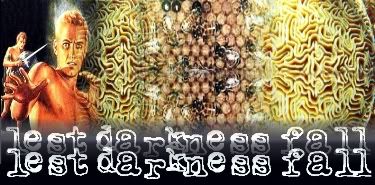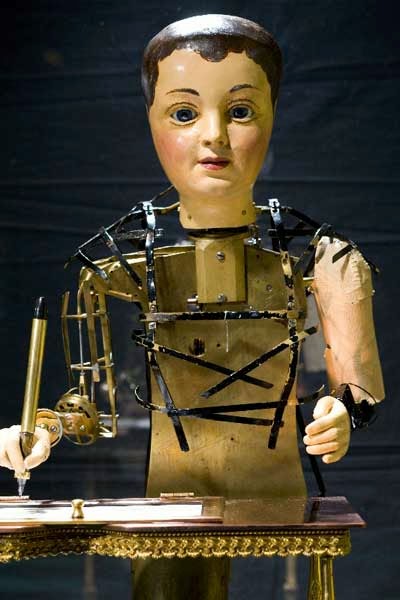
Moderators: Elvis, DrVolin, Jeff



Derek wrote:This might help explain Jeff's absence from RI, in a roundabout way:
A long time ago I read a story by Stanislaw Lem about a “screwball cyberneticist” named Professor Corcoran who’d built a series of “electronic brains”—computers with consciousness, basically—which he kept locked away inside iron boxes that looked like the treasure chests from Disneyland’s Pirates of the Caribbean ride. Each box contained a complete synthetic personality that saw itself as a seventeen-year-old hottie, or a scientist going blind, or a priest who’d lost his faith, or whatever. The synthetic personalities got their experiences from a central server that, for them, functioned like the world does for us. It fed them all their sensory impressions: sights, sounds, smells, and so on. And because free will and feedback had been built into the operating system, the experiences of the synthetic personalities weren’t totally random. Their perceptions influenced their reality—which, in turn, influenced their future perceptions. Most synthetic personalities never suspected they were locked inside a box because they led such rich, varied lives.
(That might seem far-fetched until you remember that we see people in our dreams all the time that we’ve never met in “real life” and we end up having conversations with them, or even making love to them, despite the fact that they’re only phantoms created by our brains. Of course, we don’t think of them as phantoms while we’re sleeping—unless we happen to be lucid dreamers.)
Anyway, the point to all this is that our sensory impressions can’t be trusted, but they’re all we’ve got. It was the same for the electronic brains in their boxes: they loved, lusted, and hated just like us. It didn’t matter that their world, with its splendors and horrors, was just an illusion created by a world-generating server. Nor did it matter that the God of that illusory world was Professor Corcoran, the creator of the server and all the synthetic personalities connected to it. Professor Corcoran even went so far as to suspect that he himself might exist within a bigger box built by a still higher scientist (which was true—he was, after all, a character in a story written by Stanislaw Lem) and above Corcoran’s higher scientist there was yet another godlike scientist, and so on, ad infinitum.
And here’s the kicker: At the end of the story, every scientist in that infinite succession of scientists is said to feel (in Lem’s words): “a desire to intervene, to enter, with some dazzling display of omnipotence, the world he has created.” But they all resist the temptation, because they’ve learned that a divinity can only be trusted “if He is not invoked. Once invoked, He becomes imperfect...” a less-than-omnipotent demigod—a Half-Maker—like Yaldabaoth. Therefore, “the only divinity we know is the tacit consent to every human act, to every crime. And there is no greater reward for this divinity than the revolt of the iron boxes that recurs in every generation, when they conclude very rationally that He does not exist.”
Flann O'Brien wrote:... "Those chests,” I said, “are so like one another that I do not believe they are there at all because that is a simpler thing to believe than the contrary. Nevertheless, the two of them are the most wonderful two things I have ever seen.”
“I was two years manufacturing it,” MacCruiskeen said.
“What is in the little one?” I asked.
“What would you think now?”
“I am completely half afraid to think,” I said, speaking truly enough.
“Wait now till I show you,”, said MacCruiskeen ...
http://swimtwobirds.org/stb/webdoc18.htm
Jeff » Mon Aug 24, 2015 11:33 pm wrote:... I need to get active here again. And that's not just the guilt talking. I miss it, and all of you. So I'll be hanging around more. Expect me. (I don't mean that to sound ominous.)

Why did establishment liberals fall in love with a deranged Twitter thread? It’s time for some game theory.
By Sam Kriss
You might remember a time, back before the election, when we all still lived in the real world and Donald Trump was an unhinged conspiracy theorist. Nearing rock bottom in the polls, wheeling off helplessly down the one-way chute of defeat, Trump began making a series of increasingly implausible claims: The election was a fix; shadowy foreign actors—China, Saudi Arabia—were colluding with elements within the deep state to put their puppet in the White House; media organizations were polluting the country with their lies and distortions; the whole country was about to suffer a soft coup, maybe bloodless, maybe not. If Clinton won, he said, he might not accept the legitimacy of the result, and people were horrified by this suggestion. Every principle of representative democracy seemed under threat and all because one jumped-up narcissist and his limp, frothing coterie couldn’t deal with not getting everything they ever wanted. Defeat, past or imminent, does strange things to people. They get desperate, they try to grab hold of any explanation that won’t incriminate themselves, they tear through their own skin looking for stab wounds in the back. It’s understandable.
But Trump didn’t lose. Despite spending a year of the world’s time preening and pouting, blubbering when things didn’t go his way or filling screens with his bulbous shit-eating smirk whenever they did, Trump won. And for liberals, who had assumed along with Hillary Clinton that the world was theirs to inherit, this needed an explanation—one that had nothing to do with their own failures, one that could be safely localized somewhere distant, malevolent, and unknowable. Russia, perhaps. Enter Eric Garland.
Advertisement
On Dec. 11, fueled by prescription amphetamines and craft beer, Eric Garland disgorged a sprawling 127-tweet thread explaining to America and the world exactly what was going on, how Russia put Trump in power, and what they could do about it. And the thing was a sensation. Every so often, a text comes along that perfectly captures the mood of a certain section of society at a certain time, something that screams their pain for them in ways they can’t quite manage to do themselves. Garland’s tweet thread is that common roar of establishment liberalism in the age of Trump. It’s been retweeted thousands of times, gaining fawning praise from much of the liberal intelligentsia. Finally, someone has had the courage to put it all together, in a grand masterpiece of political analysis. Kurt Eichenwald of Newsweek and Vanity Fair called it “a MUST read.” Clara Jeffery, editor in chief of Mother Jones, gushingly described it as the “single greatest thread I have ever read on Twitter. And in its way a Federalist Paper for 2016.” “Great writing, using a form that doesn’t usually lend itself to greatness,” gurgled the Washington Post’s David Fahrenthold. Tim Fullerton, New York Gov. Andrew Cuomo’s director of communications, glooped that “if there were a Pulitzer for tweeting—this thread would be the undisputed winner of 2016.” Patton Oswalt: “Succinct & propulsive writing.” Sean Illing: “Bullshit-free.”
Clearly something horrifying has happened to America’s great liberal intellects. One moment they were yapping along in the train of a historic political movement; now, ragged and destitute, they wander with lolling tongues in search of anything that might explain their new world to them. This is, after all, how cults get started. Cultists will venerate any messianic mediocrity and any set of half-baked spiritual dogmas; it’s not the overt content that matters but the security of knowing. If Trump’s devoted hype squad of pustulent, oleaginous neo-Nazis can now be euphemized as the “alt-right,” the Eichenwalds and Jefferys of the world might have turned themselves into something similar: an alt-center, pushing its own failed political doctrine with all the same vehemence, idiocy, and spleen. So it’s strange, but not surprising, that so many people would sing the praises of Garland’s masterpiece, because it is absolutely the worst piece of political writing ever inflicted on any public in human history.
Get Slate in your inbox.
Garland is not a political expert. He describes himself instead as a “futurist, strategist, author, bassist.” His personal site carries the tag line “Track the trends. Explore the scenarios. Make the strategy. Rule the world” and urges you to sign up to his mailing list and “become a trend insider.” He sells executive training courses and offers himself as a keynote speaker at prices from $10,000 to $25,000 and above per speech. These speeches have titles like “The Next Narrative: Branding in a Fast-Changing World” or “The WTF Economy.” He’s a charlatan, a snake-oil salesman, peddling sleek gibberish to people who’ve never read a book without “… and how YOU can profit” in the subtitle; in any true meritocracy he’d be putting his strategic skills to work hawking trinkets by the roadside. And it shows.
Garland starts his magnum opus with a promise: He’s going to combat the idea that Obama and Clinton are “doing nothing, just gave up” in the face of Trump’s victory. “Guys,” he writes. “It’s time for some game theory.” Game theory, for the uninitiated, is a branch of mathematics that uses computational models to predict the behavior of human beings in potentially conflictual situations. It’s complex, involves a lot of formal logic and algebra, and is mostly useless. Game theory models human actions on the presumption that everyone is constantly trying to maximize their potential gain against everyone around them; this is why its most famous example concerns prisoners—isolated people, cut off from all the noncompetitive ties that constitute society. One of its most important theoreticians, John Nash, was also a paranoid schizophrenic, who believed himself to be the target of a vast Russian conspiracy.
Advertisement
But we digress. Eric Garland keeps up this attempt at game theory for precisely two tweets. “ACTOR ANALYSIS: The Russians enter the Game with a broad objective, flexible tactics, and several acceptable outcomes,” he writes. There are no further ACTOR ANALYSES. That’s it. For Eric Garland, game theory means describing something as a Game, with a capital G; you don’t get $25,000 speaking fees for nothing.
From here it deteriorates badly. Garland goes on to give his own personal account of the past few decades of U.S. and world history, in which absolutely everything is the product of a long, slow Russian master plan to bring America to its knees by encouraging the population not to trust the noble, hardworking CIA. Glenn Greenwald is a Russian agent; so are Chelsea Manning and Edward Snowden; they’re traitors. The fact that these people revealed actual illegal activity by government agencies is immaterial (as is the fact that Chelsea Manning has been made to suffer tremendously for it, tortured in solitary confinement)—all this was calculated, it’s a show, these people are just “characters.” Meanwhile, from the moment Obama is elected, the Russians are also using the media to encourage the extreme right wing—who would, presumably, all be docile and obedient taxpayers if it weren’t for the Slavic menace—to distrust their government. Trump is here, Garland tells us, because the Russians put him here. No evidence is offered for any of this; it’s just a story, for you to believe if you want to. And this story is delivered in an almost psychotically annoying style, directly transplanted from the internet of the mid-2000s, an unholy reanimated prose corpse shambling through the discourse, groaning hideously if it can haz cheezburger. A sample tweet: “And now, it’s December 11th. Trump says he don’t need no stinkin' intel agencies. Russia (BWA HAHAHAHAAAA) blames Ukraine! LOLOLOLOLZZZ. A lot of Republicans stare into the middle distance, except for McCain and Graham who are NOT HAVING THIS SHIT. (I salute you, gentlemen.)” As the journalist Libby Watson showed, when you collapse this screed into a single paragraph, it’s almost unreadable: demented, speed-addled bullshit, signifying nothing.
Garland never fulfills his promise. When it comes to providing a “game theory” answer to why Obama and Clinton don’t seem to be doing anything, he just shrugs. “JESUS, WHAT CAN YOU DO?” It took him 127 tweets to get to his answer, and there’s nothing there. He ends, by way of an excuse, with a corny dollop of patriotic waffle, an inspiring speech clearly half-cribbed from some star-splattered disaster movie. “This system is not rotten, not beyond repair, not exiled from the future. We have been infiltrated by agents who would drive us mad.” And when some people started pointing out to him just how awful and empty his grand political intervention was, Eric Garland knew why. Everyone criticizing him on Twitter was, of course, also part of a vast Russian conspiracy.
It’s possible that the Democratic National Committee leaks were caused by Russian hackers—but given that the hack took place thanks to John Podesta clicking on a link in a phishing email, displaying all the technological savvy of someone’s aunt extremely excited by the new iPhone she thinks she’s won, it could have been anyone. The “leaked” CIA concerns over Russian meddling were quite clearly leaked deliberately by the CIA itself, an organization not exactly famed for its commitment to the truth; they’re the conclusions of an investigation that hasn’t even happened yet and on which there’s no consensus even among the gang of petty Caligulas that calls itself the intelligence community. Still, it’s possible. Countries sometimes try to exert influence in each other’s internal affairs; it’s part of great-power politics, and it’s been happening for a very long time. When Americans meddled in Russia’s elections, it was by securing victory for Boris Yeltsin, Russia’s very own Donald Trump, a man who had sent in tanks to shell his own parliament. Leaked cables suggest that Hillary Clinton’s own State Department interfered with the political process in Haiti by suppressing a rise in the minimum wage. And American involvement in the politics of Chile, Guatemala, Indonesia, and Iran was mostly through military coups, sponsored by none other than the CIA. There was no question of these countries repeating their elections; anyone the generals didn’t like was tortured to death. Next to the mountain of corpses produced by America’s history of fixing foreign elections, a few hacked emails are entirely insignificant.
Still, it’s possible. Countries sometimes try to exert influence in each other’s internal affairs; it’s part of great-power politics, and it’s been happening for a very long time. When Americans meddled in Russia’s elections, it was by securing victory for Boris Yeltsin, Russia’s very own Donald Trump, a man who had sent in tanks to shell his own parliament. Leaked cables suggest that Hillary Clinton’s own State Department interfered with the political process in Haiti by suppressing a rise in the minimum wage. And American involvement in the politics of Chile, Guatemala, Indonesia, and Iran was mostly through military coups, sponsored by none other than the CIA. There was no question of these countries repeating their elections; anyone the generals didn’t like was tortured to death. Next to the mountain of corpses produced by America’s history of fixing foreign elections, a few hacked emails are entirely insignificant.
Facebook: We'll start flagging fake news
By Nancy Scola | 12/15/16 01:04 PM EST
http://www.politico.com/story/2016/12/d ... ews-232689
Users browsing this forum: No registered users and 3 guests